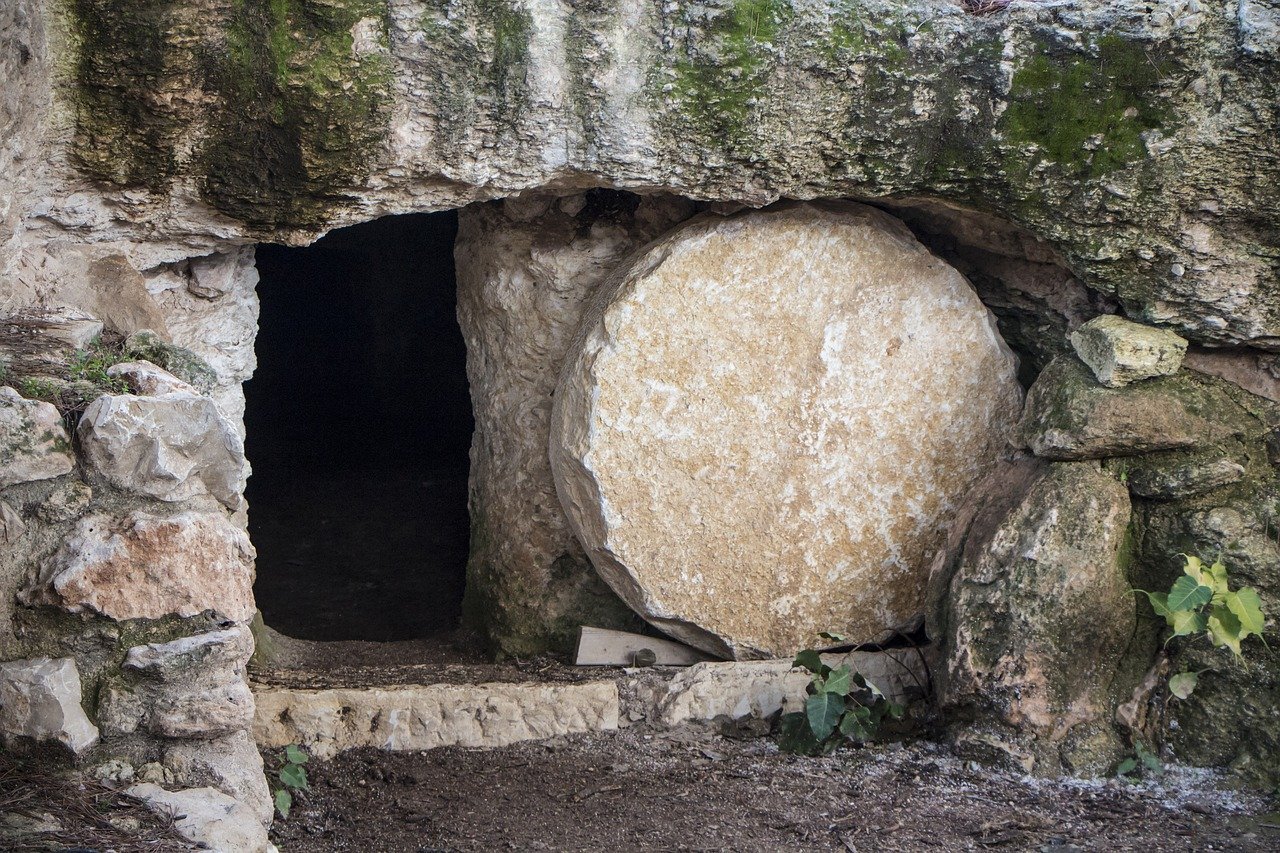
The uniqueness of Christianity lies in the resurrection of the Lord Jesus Christ from the dead. Scoffers and sceptics have sought to explain it away. However, the sweet influence of new life in the literal bodily resurrection of Christ has endured over the two millennia and still speaks to new generations of believers today. The comfort and happy prospect of the believer’s resurrection is linked inseparably to the resurrection of Christ. Because he rose, we shall rise.
The true story of the resurrection of the Saviour has been told and retold down the centuries. It will be told for ever, and we shall never forget it. Very early in the morning, at the rising of the sun, women visited the tomb, but found the stone rolled away. Their hearts beat faster. Questions and surprise seized their minds.
Then two angels in shining garments said: ‘Why seek ye the living among the dead? He is not here, but is risen…’(Luke 24:5-6). They trembled and were amazed. The shock of the occasion was evident.
Mary Magdalene went and told the disciples who were mourning and weeping (Mark 16:10). Mourning was turned into joy as events unfolded. Today we can look back at the cross through the eyes of the resurrection. Think of the implications.

Righteousness
Death could not hold Jesus Christ — he is alive. Satan could not destroy him — he is victorious. His body saw no corruption — he is perfect for ever. The Holy Spirit says: ‘O grave, where is thy victory?’(1 Corinthians 15:55). For Christians yesterday, today, and for ever, the resurrection of Christ represents the most glorious and momentous event of history. What are its implications?
Firstly, the resurrection brings righteousness. He was ‘delivered for our offences, and was raised again for our justification’ (Romans 4:25). When we trust in Christ, the Father justifies us by imputing to us the perfect righteousness of his Son.
The Holy Scriptures say: ‘He hath made him to be sin for us, who knew no sin; that we might be made the righteousness of God in him’ (2 Corinthians 5:21). In God’s eyes ‘all our righteousnesses are as filthy rags’ (Isaiah 64:6). Note that ‘righteousnesses’ is in the plural, meaning all our best efforts; these are worthless to our salvation.
Being baptised or confirmed, becoming a church member, signing a pledge, and making good resolutions may all be good things to do. But we must never consider them to be meritorious works that can bring salvation from God.

Regeneration
Secondly, salvation is the work of God, not man. There can be no salvation for those who trust in their own acts of righteousness to commend them to God. The Holy Spirit says in the New Testament: ‘Not by works of righteousness which we have done, but according to his mercy he saved us, by the washing of regeneration and renewing of the Holy Ghost’ (Titus 3:5).
Nothing we have done, or will do, can make us acceptable to God. It is all of grace from start to finish, for he has ‘saved us … not according to our works but according to his own purpose and grace, which was given us in Christ Jesus before the world began’ (2 Timothy 1:9).
The key factor to note is that Christ’s righteousness is credited to us when we are regenerated by the Holy Spirit of life, receive the gift of ‘saving faith’, and put our trust in him. Salvation is by grace alone through faith alone.
However, faith is never alone because it will manifest itself in good works. For the Spirit of Christ not only imparts new life to sinners who were ‘dead in trespasses and sins’, but takes up residence within them, bringing forth the ‘fruit of the Spirit’ in their practical, everyday lives (Galatians 5:22-23).

Reconciliation
Thirdly, the resurrection brings reconciliation. On the cross, God was in Christ reconciling the world unto himself ( 2 Corinthians 5:19). But it is the resurrection that confirmed that Christ’s self-offering had been accepted and propitiation was complete. That is why Paul and the other apostles preached ‘Jesus and the resurrection’ (Acts 17:18).
Preachers and teachers have been entrusted with the word of reconciliation. We were once enemies, without strength to save ourselves, worthy of eternal hell because of our sins. But because of his great mercy and grace we are no longer at enmity with God.
Like Joshua in Zechariah’s vision, we are ‘brand[s] plucked out of the fire’, and this should be our testimony to this lost world (Zechariah 3:2; Jude 23). Now we are reconciled to God by the cross (Ephesians 2:16; Romans 5:10). Now we know we have eternal life through the Son of God (1 John 5:13). Now we ‘joy in God through our Lord Jesus Christ, by whom we have …received the reconciliation’ (Romans 5:11 mg).

Reality
Finally, the resurrection brings reality. Through the righteousness of God and reconciliation with God, we have the reality of peace with God, for there is now ‘no condemnation to them which are in Christ Jesus’ (Romans 8:1).
Furthermore, we have the reality of access into God’s presence without fear. We may come boldly to the throne of grace, where the risen and exalted Christ dispenses ‘grace to help in time of need’ (Hebrews 4:16).
We also have the reality of rejoicing in hope of the glory of God, fearing no rejection. We have the reality of the love of God shed abroad in our hearts by the Holy Spirit, and much, much more (see Romans 5:1-5). There is no loneliness, since we walk with the risen Christ.
Response
We have called to mind Gethsemane, the betrayal, the trial, the crucifixion, the burial and the resurrection of the Lord Jesus Christ. If we are believers, we should respond by giving more time to these aspects of the Gospels, for these events should galvanise us to worship, faith and witness.
And if you are not already a believer? May the risen Christ make you a new creation; then you will no longer be under condemnation. May the resurrection of Jesus bring you reunion with God; then you will be justified and declared righteous by God. May God the Father do this by the power of the Holy Spirit and for the honour of his Son, who is the King of Kings and Lord of Lords.








